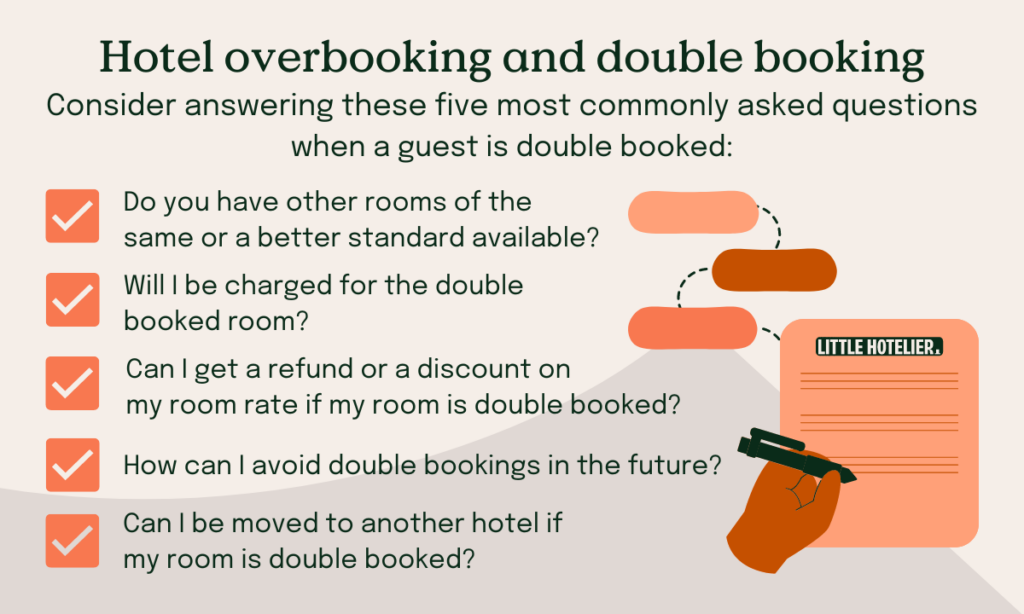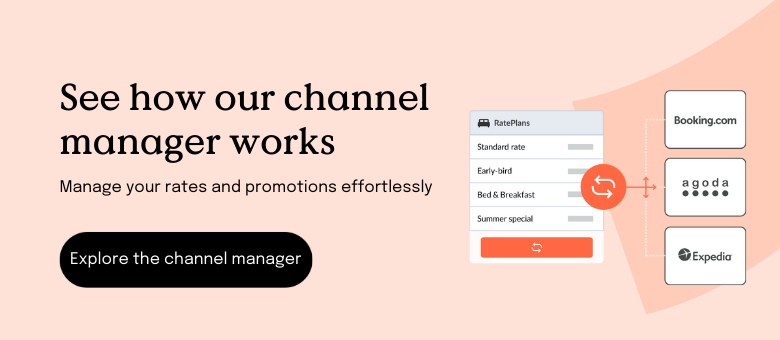What is double booking and overbooking in the hotel industry?
Double booking is the unfortunate occurrence of accidentally booking one room at your property for two different customers on or overlapping the same dates. Usually, this is accidental and can cause a lot of stress for all parties involved.
Essentially the same as double booking, overbooking occurs when the total number of bookings for a time period is greater than the number of rooms available. This means if all guests follow through with their reservation, some rooms will be double booked.
Naturally, if guests are turning up to find there is no room available to them they won’t be too quick to sing your praises.
Whether you label them double bookings or overbooking, you’re probably clear on the definitions by now. Let’s use this blog to deep dive and discover all the reasons unwanted double bookings might be happening, how to prevent them, and how to manage overbooking and double booking at your property.
The Impact of Overbooking and Double Booking
There is nothing more damaging to your hotel or B&Bs brand reputation than having to tell a guest, after all their planning, that you can’t give them their room because it was double booked!
Unfortunately, this is an issue for many small properties, whether it’s due to an inability to process a payment at the time of booking or because their distribution process is too complicated and they cannot keep track of which rooms have been booked on which OTAs.
No matter what the reason is, this is an unprofessional practice that can leave a guest searching for alternate accommodation when they should simply be enjoying their holiday.
Double bookings and overbooking can be a nightmare for your property and has the potential to impact your business negatively long-term (taking into account some operators use it as a tactic).
Disadvantages of double bookings and overbooking include:
- Bad customer experiences that lead to negative word of mouth
- Negative reviews on influential sites such as TripAdvisor or Facebook
- Lost revenue, not just from the booking but from any potential extra expenditure
- Likelihood that you lose the customer forever
- Loss of guest loyalty if a repeat guest gets double booked
- Consumption of time and resources spent compensating the guest and resolving the situation
- Risk of failed partnerships with online travel agents or booking sites if problems occur regularly
There can be quite the domino effect if a double booked guest becomes disgruntled. What if they make a scene at your front desk? What if they leave negative reviews? What if they tell their friends and family about their poor experience? Word can spread quickly that you aren’t taking care of your reservations – which is the last thing you want!

Reasons for overbooking and double booking
There are a few reasons why you might be experiencing overbooking scenarios, and not all of them are your fault as we’re sure you’re aware.
- If your property is fully booked and a problem occurs where repairs are required or you need to close a room suddenly, this will leave some guests disadvantaged.
- It can also occur when you are forced to update and manage your inventory manually. If you’re advertising your rooms on multiple sites at the same time, you may be too slow to update one site when a booking is made on another. Someone else books the same room in the meantime. You can avoid this by splitting your inventory of course, but then you risk not achieving the occupancy rate you need.
- Another possible cause of a double booking is not updating your availability correctly on your booking sites such as Booking.com. For example, if you indicate that you have two rooms available when you just have one available – and then both rooms are booked.
Lastly, some accommodation providers will deliberately overbook their hotel, for strategic reasons. While it’s not necessarily recommended for small properties we have more on that in the next section.
Overbooking strategy: Why do hotels overbook their rooms?
Hotels will sometimes overbook their property either because they can’t process credit cards at the time of booking or for other revenue management purposes. There will always be guests who don’t show up or simply cancel and this means a loss of revenue. Overbooking allows for some drop-offs and you can still have a fully booked property each night.
This is almost like gambling, in that the hotel is betting against some of their confirmed reservations actually arriving. You will make your own decisions on whether this is viable or not, but usually you’ll want some accurate forecasting and historical data to be safe in your assumptions. To get it right, you probably need to use a software solution like a revenue management system, which could be an unwanted expense at your property.
The hotel may not mind needing to find excess guests alternative accommodation at their own expense since the existing fully booked rooms will make up for it. Many properties will even pre-arrange agreements with each other to prepare for such outcomes.
However it may impact the ability to attract new customers in the long run and hotels should take into account what type of guest they are relocating. Were they a potential long-term customer, a high spender, or simply a one-time overnight stay?
How to avoid overbooking and prevent double bookings
It’s a much safer policy to try to avoid the hassle of double bookings – and you can still achieve great occupancy rates! Using quality software to help run your property will ensure you can control your bookings and minimise the risk of double bookings.
Effectively managing your hotel’s reservations and avoiding double bookings is essential for maintaining a smooth operation and ensuring guest satisfaction. By implementing quality hotel management software and following best practices, you can achieve high occupancy rates while keeping double bookings at bay.
Here are three of the best ways to effectively and efficiently avoid double bookings:
1. Using a channel manager to boost distribution without risk
Updating your inventory across multiple online booking sites puts you at high risk of overbooking or double booking, and consumes a lot of time that could be better spent personalising your guest’s experience.
With 95-97% accuracy, a channel manager is the optimal way to save time and manage the distribution of your property’s inventory across the web.
Investing in a channel manager that uses a pooled inventory method will allow you to increase bookings with broader distribution across as many booking sites as necessary without any added cost or risk.
With pooled inventory, each time a booking is made on one of your channels your inventory on all other sites, including your brand website, will be updated in real time.
With an all-in-one solution like Little Hotelier channel manager for hotels, you will be able to distribute your rooms across over 450+ booking channels and, with an added 24-hour PMS operating, all of your incoming bookings will be synchronised and your availability updated automatically to eliminate the chances of double-bookings.

2. Using direct booking technology for a professional user experience
With an efficient online booking process on your brand website incoming traffic will know which rooms are available and will be able to book instantly while browsing.
This will not only generate commission-free direct bookings, but will create a clear booking path that will steer clear of double-bookings.
You will also have the ability to charge cancellation fees if your guest does not show up or backs out.
A booking engine also lets you capture direct bookings on your website or Facebook page, taking charge of the guest relationship and reducing your commission fees. Modern channel managers integrate with booking engines and front desk systems to create a seamless process from start to finish.
3. Using a front desk system to manage everything from one place
A successful distribution strategy can all be undone if you don’t have one place to keep an eye on everything and ensure you know exactly when your guests are arriving, while also being able to quickly update your room rates and availability when someone calls or you receive a walk-in.
With Little Hotelier’s Front Desk System you can check your availability, create and edit reservations, create and edit room closures, and check guests in and out from any device at any time.
These three systems provide a comfortable safety net, so you will never have to deliberately overbook your rooms.
BUT you don’t get away with doing nothing! You’ll still have to remember to update your systems when you receive walk-in bookings or bookings via phone – if you allow them at your property.
Hotel overbooking policies and compensation
Alright, so in most cases hotels are free to set their own policies regarding reservations and cancellations. You should make sure you have clearly defined policies at your property and on your website. This way, you’ll always be protected if a guest makes an unfair dispute or complaint.
In the case of double bookings you have an obligation to resolve the situation for your guest, even if there may be no law dictating it. It’s fair to say if you turn guests away with a no care attitude, your business won’t last long.
When a guest is double booked, consider answering these five most commonly asked questions:
1. Do you have other rooms of the same or a better standard available?
- Yes: To make sure your guest still has a great experience at your property, it’s best to accommodate the guest in one of these rooms with no extra cost to them.
- No: It’s your responsibility to find them accommodation of the same or a better standard and cover the costs. You should also organise transportation to the new property. In this situation, the guest should absolutely not be out of pocket because they were double booked at no fault of their own.
2. Will I be charged for the double booked room?
If a guest doesn’t get to use the room they’ve booked, they shouldn’t be charged for it. In some countries/jurisdictions, trying to do so may even be against the law. Instead, consider either transferring/upgrading the guest to a different room or, if none are available, transferring them to different accommodation.
3. Can I get a refund or a discount on my room rate if my room is double booked?
Double bookings can be extremely frustrating for a guest, and it’s typical to offer a refund or a discount on a room rate if the guest can’t enjoy the full experience that they paid for. The exact terms vary based on hotel policy. Some things to consider include:
- Can the guest experience at least some or all of their expected experience in an alternative room?
- How much of an inconvenience does the double booking cause the guest?
- What are the legal requirements for your jurisdiction, in terms of providing services that match what was advertised and agreed to?
- Is the double booking for the full length of the guest’s stay, or only partial?
- Is there a similar or better alternative accommodation nearby that you would be able to send your guest to instead?
These factors will help you decide on your policy around discounted rates or refunds on double bookings.
If you ‘walk’ a guest without proper compensation, you may expose yourself to a lawsuit. No one wants to go through that. If a guest simply wants a full refund, you should absolutely consider complying with that too – even if it means you miss out on a commission from another property.
To ensure the experience with the double booked guest is as positive as possible, make sure you offer an apology, treat them with empathy and understanding, and perhaps offer them a discounted stay next time they’re in town. You don’t have to lose them forever!
4. How can I avoid double bookings in the future?
Double bookings are usually the results of systems being out of sync. There are a few ways to correct this:
- A channel manager lets you advertise rooms on multiple booking sites at once. When a reservation is made, it updates your hotel system and other channels in real-time, ensuring guests see accurate, up-to-date availability.
- A booking engine enables secure credit card payments during reservation. This allows direct payment to your bank account and helps charge cancellation or amendment fees if guests change or cancel their booking.
Trust us, it’s possible. See how a top villa in Asia has overcome double bookings with Little Hotelier.
5. Can I be moved to another hotel if my room is double booked?
It’s on you to find them a place to stay that’s just as good or even better, and to cover the costs. Don’t forget to sort out their ride to the new spot. Remember, in a double booking situation, the guest shouldn’t have to pay anything extra – it wasn’t their mistake!
By Dean Elphick
Dean is the Senior Content Marketing Specialist of Little Hotelier, the all-in-one software solution purpose-built to make the lives of small accommodation providers easier. Dean has made writing and creating content his passion for the entirety of his professional life, which includes more than six years at Little Hotelier. Through content, Dean aims to provide education, inspiration, assistance, and, ultimately, value for small accommodation businesses looking to improve the way they run their operations (and live their life).
Table of contents
“Our accommodations are perfectly taken cared of, thanks to Little Hotelier. It's now easier to get real-time info! Payments are easily traced too.”
General Manager, Marina View Chalets








